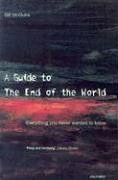
A Guide to the End of the World: Everything You Never Wanted to Know PDF
212 Pages·2004·8.078 MB·English
Most books are stored in the elastic cloud where traffic is expensive. For this reason, we have a limit on daily download.
Preview A Guide to the End of the World: Everything You Never Wanted to Know
Description:
Dr. Bill McGuire, a volcanologist by training, and a Professor of Geophysical Hazards at the University College in London, England, is a man worth one's attention when it comes to discussing massive, if unlikely, disasters.
McGuire has been criticized by some as a self-aggrandizing Cassandra. This envy-based criticism becomes invalid as one reads this and other works by him on the such subjects as mega-tsunamis, supereruptions, climate change, (both warmer and colder), giant earthquakes, impacts of asteroids and comets, breakdown of ocean currents, and like matters. McGuire has the unique capability of mastering all of these subjects and presenting them as a cohesive whole. That is what he has done in this book.
Make no mistake, McGuire is not talking about the planet being blown to smithereens. Rather, he addresses the effect of events that have occurred before, and will occur again, in the history of our planet that could lead to the end of civilization as we presently know it.
By way of example, considered as a whole, an 8.7 earthquake in the South Sandwich Islnds off Antarctica would have little effect on most of the world , but such an event centered in the Tokyo-Yokohama area could very easily lead to a collapse of most of the world's economies, widespread famine and warfare, etc.
The same is even more true of the impact of a one-kilometer asteroid with the Earth, a long-term change in climate, a Yellowstone-sized supervolcano going off, and the like. McGuire accurately points out that, should any of these dire events come to pass, there is not much that could be done except to endure the consequences. However, early detection of those events that could be forecast, and subsequent preparation, would help immensely to soften the blow.
McGuire is a delightful, sprightly writer, especially considering the morbid nature of the subject, and in so doing, he reminds us of the indomitability of the human spirit. His subtle but keen wit makes the book entertaining as well as valuable.
One should not be deluded that the book is an exhaustive treatise on all potential disasters. For example, a massively disastrous plague is not included. Nor is the book even an all-encompassing narrative covering all facets of the events discussed. Rather, it is a very good introductory guide to some of the greater hazards we face that are given short shrift by most people, and by their governments. Hopefully, McGuire's book, and your reding of it, will help change this unfortunate latter aspect of things. Every responsibler citizen should be conversant with the contents of this book.
The book is enjoyable and highly recommended.
See more
The list of books you might like
Most books are stored in the elastic cloud where traffic is expensive. For this reason, we have a limit on daily download.
